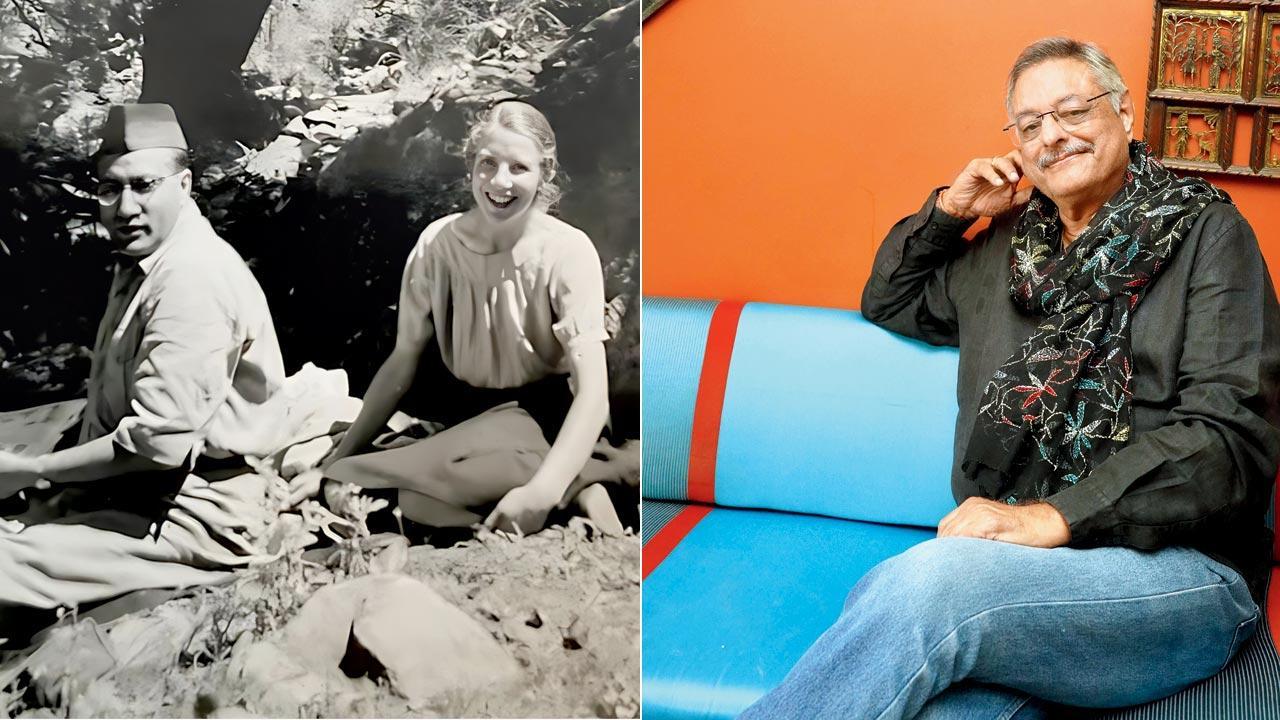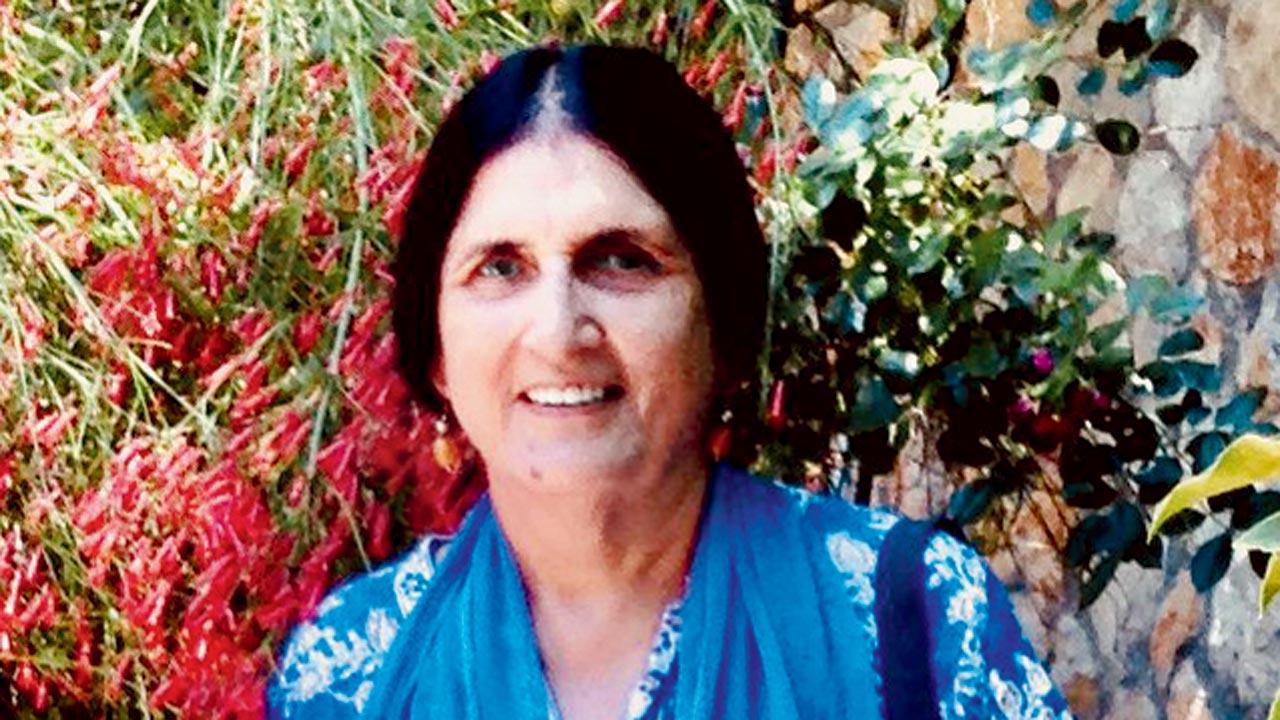India’s most famous TV host from the ’90s, Siddharth Kak, and his aunt revisit letters, diary entries and memoirs from half a century ago to paint a portrait of Kashmir’s last pandit prime minister and his wife

A picnic for the newlyweds, Ram Chandra Kak and his wife Margaret, in the Dara Valley, 1937; (right) Siddharth Kak says that his experience as a television host on Surabhi had him realise that audiences connect with people rather than facts, a learning he brought to the writing of this book. Pic/Aishwarya Deodhar
When Billy was leaving Kashmir with her mother for England in 1947, the bald facts were that the plane came and they took off, and that Bhaiji could not see them off, but he was there two days earlier when the flight got cancelled. Now, did he express any affection to his daughter [Billy] who he might not see for a long time, if at all? Did he express any affection to his wife of 10-plus years? Could Billy remember that physical moment? She tried to recollect, because if you can physically describe the parting rather than simply stating the facts, you are able to understand the emotions of the people and relate to them,” documentary maker, television producer and author Siddharth Kak tells mid-day.
ADVERTISEMENT
Kak is speaking about his late grandfather Ram Chandra Kak, the Kashmiri Pandit prime minister of Jammu and Kashmir, who was separated from his family, after he was ousted by Maharaja Hari Singh, and put behind bars on the eve of India and Pakistan’s independence. Over the decades, the blame for Maharaja Hari Singh’s indecision regarding Kashmir’s position has been laid at the feet of Kak’s grandfather. But, the truth has many layers, he feels.
Kak—most well-known as the producer and presenter of the ’90s’ cultural show Surabhi—and his aunt Lila Kak Bhan, fondly called Billy, have dipped into personal interviews, family letters and diary entries to tell the story of Ram Chandra Kak and his wife Margaret. Their just-released book, Love, Exile, Redemption: The Saga of Kashmir’s Last Pandit Prime Minister and his English Wife (Rupa Publications) is both, a political and familial memoir.
 Lila Kak Bhan
Lila Kak Bhan
Kak’s years as a television host, communicating with large numbers of people, helped him look at his grandparents’ story differently. “People connect with people. Unless they are historians or researchers, they won’t connect with the facts. It’s not good enough to say that he [my grandfather, Ram Chandra Kak] called Sheikh Abdullah [founding leader of the Jammu and Kashmir National Conference and the first elected prime minister of Jammu and Kashmir after its accession to India] here, or, that he stopped [Jawaharlal] Nehru at the border,” he states. “These are facts we know. What went behind them? What was he thinking? [The character] must live, we must understand the reasons for his actions.”
Kak has in the past worked on Surabhi Ke Sau Sawaal, a volume based on the long-running TV programme, but this latest book, which weaves together the public and personal histories of his grandparents, posed a new kind of challenge. “I was not aware of the kind of resolution that you require to write something of this nature. It is the difference between going on a trek to Lonavla and trying to attempt Mount Everest,” he laughs.
The seeds of the book, however, were sown 50 years ago, when Kak during his visits to his grandparents’ home in Kashmir started interviewing his grandfather in a bid to write “a powerful book” to “clear his name”. “After the interviews, we would go on long walks along the rice fields and orchards in Kashmir and at night, I would write the gist of what that day’s interview had contained in longhand,” he reminisces. There are over a hundred such interviews done over a span of two years, he tells us, the records of which lay unseen in his attic in Mumbai for decades until in 2020 with the COVID-enforced lockdown, he returned to the idea of the book in earnest.
Bhan, who had her mother’s diaries and letters from 1936 to 1947 written to her parents in England with meticulous and empathetic observations of India, came in next. “The process started many years ago, when my mother would tell me about her childhood and read me extracts of letters that her parents had saved. My mother was a particularly good writer and reading her descriptions of places she saw and her experiences, became an integral part of me,” Bhan tells us.
Each author then had their own individual access to the two subjects of the book. “So, Lila wrote the chapters related to her mother, where [Margaret] is falling in love, travelling from England to India, and reflecting on her husband and the family she has come into. I wrote about my time when I was young, growing up in Kasauli and Kashmir around my grandparents and my grandfather’s archaeological and administrative work,” Kak shares.
This return to the material decades later has brought with it a greater understanding of the socio-political and administrative factors at play in Kashmir and the country during his grandfather’s prime ministership and tempered a desire to “right the wrong” of his vilification in the press, Kak tells us. There is instead a desire to put forth an alternative point of view reflected in Ram Chandra Kak’s own memoirs and to pay tribute to two unforgettable individuals and the values they passed on. “People who have not understood have said he wanted to go to Pakistan and did not want to accede to India. I thought that was a very unfair and unjust accusation,” Kak says. “Why would a man so erudite who knew Sanskrit and had studied the archaeology of India even consider going to Pakistan?” He explains that Ram Chandra Kak had a simple and practical point of view where he recommended to the Maharaja of Kashmir that as the Hindu ruler of a Muslim community, there would be trouble whichever way he leaned. And hence, not to align to any group, but be friendly towards both and then at the right time, accede to India. “My grandfather’s was the most exceptional prime ministership of any prime minister of Kashmir,” Kak states, elaborating on how Ram Chandra Kak wrote an astonishing assessment of Kashmir and also an objective self-assessment of his activities as PM. He had also proposed the first definitive joint venture between the Kashmir government and Tata group, created an infrastructure of skill development and a chain of medical facilities for the poor. “I think that he was a progressive PM who had no time to actually conduct what he had planned to do because of the unsettled situation. And let’s also remember that he was not an elected PM. He was the prime minister to the Maharaja of Kashmir. So finally, what the Maharaja of Kashmir wanted to do, that had to be done first.”
 Subscribe today by clicking the link and stay updated with the latest news!" Click here!
Subscribe today by clicking the link and stay updated with the latest news!" Click here!







